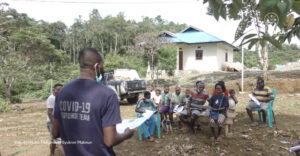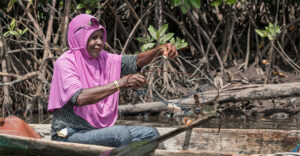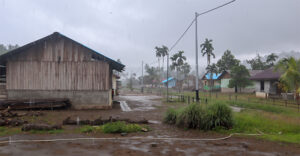
Enthusiasm was obviously looked on the looks of partner representatives participating in the activity. Let alone, it was their first time to visit Yogyakarta. “I actually had ever taken part such a training. But this CO training is different as it is directly linked to community organization on the ground,” said Yoshep, an EcoNusa partner from Jayapura.
Yoshep added that he felt so eager to apply the knowledge on CO he got during the training. Not only Yoshep, Teria, a partner from Ambon, also expressed the similar enthusiasm. “In Ambon, we have collected data from village by using our own methods. But after following the training, I am eager to create data center by applying the community organization jointly with my colleague in Ambon,” said Teria.
The materials delivered during the CO training were very holistic ranging from community organizing concept to technical aspect of community organization plan arrangement. The paradigm on community organization presented by the resource persons could shift the paradigm recognized by the participants. Salmon, a partner from Seram Bagian Bara, said, “The paradigm addressed by the instructors on community organization should consider the community as the subject of a development by empowering the community. We can hardly empower the community just by providing assistances or program socialization whose ideas are not sourced from the community.”
Applying community organization theory is not that easy. It requires consistence and longer duration to raise public critical awareness collectively. Having raised collective critical awareness, the community should be organized to identify their own challenges and solutions independently. The whole process here is also deemed an empowerment. It means that it makes community powerful, has sovereignty over their own rights for their natural resources management. Social intervention has so far been done by giving direct help, training without prior social research, top-down approach program socialization. These approaches will only weaken the community in natural resources management.
Mokan, a partner from Seram Bagian Timur, considered a significant difference from research materials he studied so far. “What I understand thus far that sampling is deemed a normal thing in a research. But here we got that Participatory Action Research (PAR) recommends not to take sampling.” Human has different awareness from the other and thus their thought could not be represented by anyone. This is the basic understanding of CO activity.
On the concluding session, the participants were divided to their working areas to arrange a follow-up action plan (RTL) based on social organizing theory. RTL was discussed together for improvement. The discussion process of RTL looked serious and dynamic. During discussion session, each active group gave feedback. “In general this activity actually opens my insights on how a CO works, builds a character and working professional in community organization,” said Semuel, an EcoNusa staff in Sorong Raya.
CO training was held at Perdikan Campus, Yogyakarta, on 5-15 January 2021. There were 15 participants from EcoNusa and representatives of partners in Maluku Island and Tanah Papua. The partner representatives will help EcoNusa implement Social Transformation School at their own working areas. During the 11-day training, the participants comprehended community organization as an organic activity along with community sovereignty principles.
Editor: Leo Wahyudi




